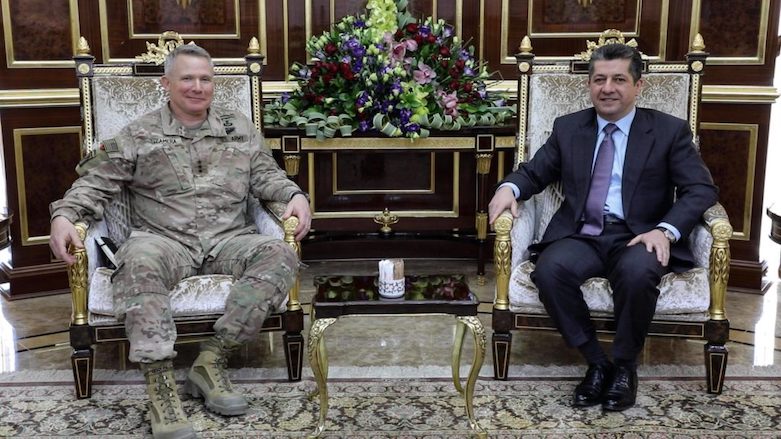Kurdistan security chief discusses lasting defeat of ISIS with Coalition Commander

ERBIL (Kurdistan 24) – Kurdistan Region Security Council (KRSC) Chancellor, Masrour Barzani, met with the Commanding General of the Global Coalition on Wednesday to discuss the lasting defeat of the so-called Islamic State in Iraq and Syria.
Chancellor Barzani received Lt.Gen.Paul LaCamera, Commander of Combined Joint Task Force – Operation Inherent Resolve (CJTF-OIR), in Erbil to discuss the “progress in the anti-ISIS campaign,” a statement on the KRSC website read.
Both sides “agreed that defeating the ISIS ideology requires addressing the underlying causes, many of them political, and restoring services and security to liberated areas.” They also “underscored the need for reconciliation” among Iraq’s religious and ethnic groups.
Iraq declared victory over the extremist group in December 2017, but over a year later, the fight to eradicate the Islamic State continues. The terror group regularly launches attacks in previously liberated areas, like Mosul, and even in places it never controlled, like the Iraqi capital of Baghdad.
Indeed, other coalition members have warned that the Islamic State could re-emerge in Iraq, if the causes of its emergence are not addressed.
Related Article: Canadian Commander warns of ISIS re-emergence in Iraq unless causes addressed
General Colin Keiver, Commander Joint Task Force Iraq, Department of National Defense, Canada, explained in an interview with The National on Tuesday that “the military side can only do so much in Iraq.”
It is vital “to go after the cause of those grievances” that led to the Islamic State’s rise in Iraq, Keiver said, “and until you do that, this is something that will continue.”
Barzani reiterated that point in a tweet on Wednesday, in which he emphasized that “the terrorist group is more than territory and fighters; it is about an ideology, and defeating it requires tackling the underlying causes.”
Pleased to see Commanding General of @CJTFOIR @lacameraOIR — We reviewed important progress against #ISIS. The terrorist group is more than territory and fighters; it is about an ideology, and defeating it requires tackling the underlying causes. Readout: https://t.co/LxkALSGoZ1 pic.twitter.com/rTv2pCtPri
— Masrour Barzani (@masrour_barzani) February 20, 2019
In his meeting with LaCamera, Barzani also “praised the Global Coalition’s continued training and aid to Peshmerga and Iraqi Security Forces,” the KRSC statement said.
On Syria, the senior Kurdish official “reiterated calls for a peaceful, negotiated settlement that protects the rights and safety of the Kurdish people.”
Related Article: Masrour Barzani calls on Syrian political factions to reach ‘common understanding,’ secure rights for Kurds
Tensionsbetween the Syrian Kurdish factions have increased since the outbreak of the Syrian civil war in 2011, during which the Democratic Union Party (PYD) established a self-administration and a military force known as the People’s Protection Units (YPG). The YPG became the leading element in the Syrian Democratic Forces (SDF), the main US partner in fighting the Islamic State in Syria.
Reportedly, one element in the US plan for its withdrawal from Syria is promoting pluralism in the areas now under SDF administration to help ensure political stability. So far, the PYD has dominated to the exclusion of other parties.
Masoud Barzani, former President of the Kurdistan Region and current leader of the Kurdistan Democratic Party (KDP), previously mediated between the PYD-led ruling council of Syrian Kurdistan (Rojava) and the Kurdish National Council (known as the KNC or ENKS).
Three agreements were concluded, between 2012 and 2014. However, none proved enduring because of political disagreements between the two blocs.
Editing by Laurie Mylroie
